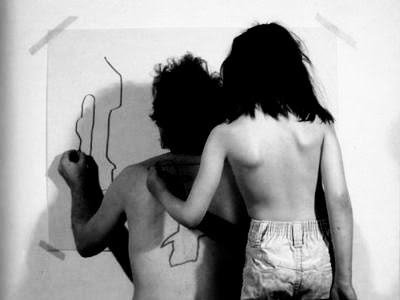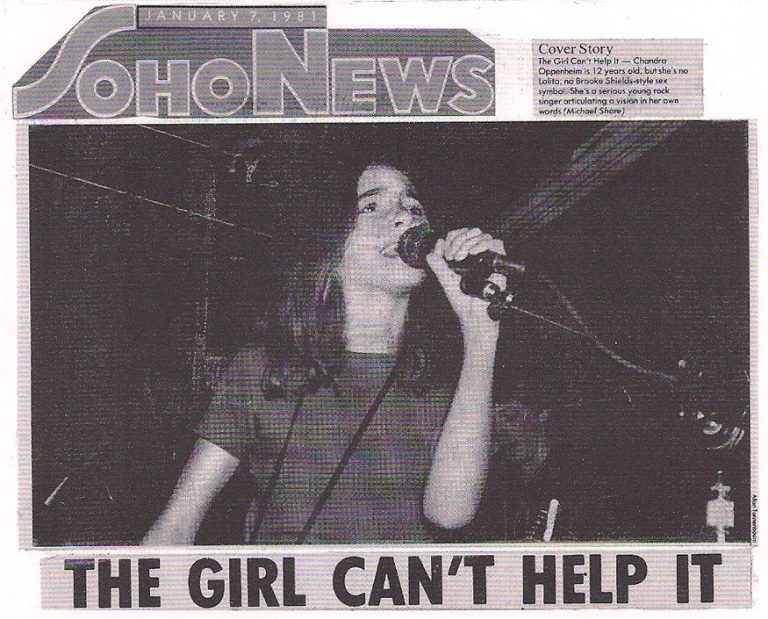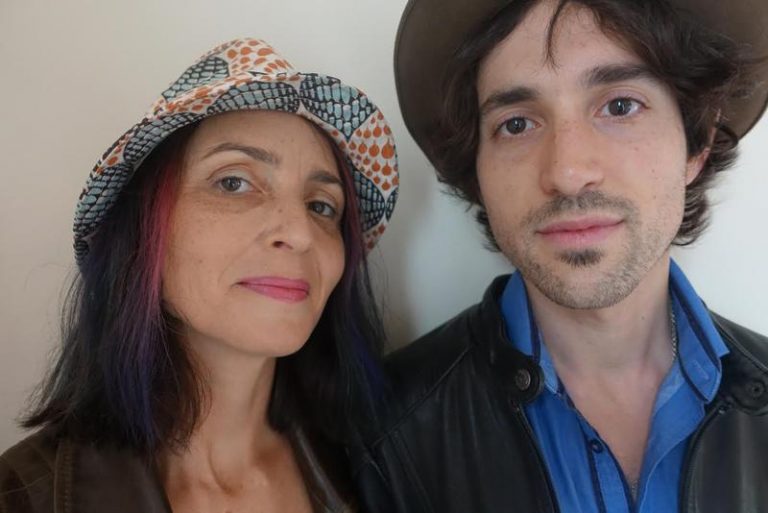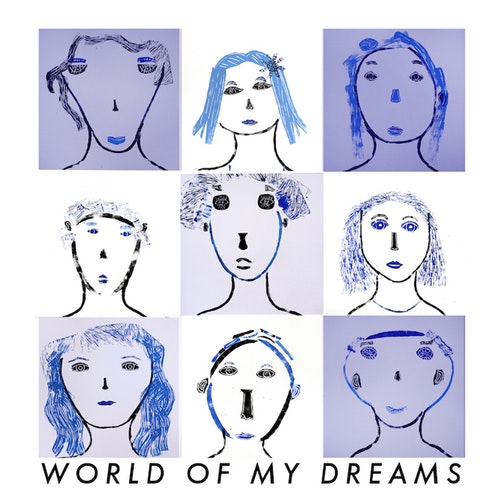
editor’s note: Chandra Oppenheim will premiere World of My Dreams, the debut album by her collaborative group, the Young Songwriters Project, tomorrow (!) at SPACE. Featuring the music and vocals of songwriters ages 4 to 14, the debut performance and double album are the result of Chandra’s life-long pursuit of intuitive art-making. One of our summer interns, Miles Brautigam sat down with her earlier this week.
I met Chandra Oppenheim at the door of her Eastern Promenade home. She showed me to a seat at the table and offered me a mug of tea. Her home décor is surprisingly traditional for the living space of a woman grew up the daughter of a conceptual artist and fronted a post-punk band at 12 years old. Yellows, greens, and white compose the color palate in her kitchen, and from where I sit, I can spot several posters for the upcoming World of my Dreams album release show afixed to her walls.
World of my Dreams is the culmination of Chandra’s four-year effort with the Young Songwriters Project. The record is composed of original songwriting by grade-school students, including her own daughter. The double album features two versions of each song: one sung by the young songwriter and another sung a seasoned local vocalist, both with the same backing band of top-flight Portland musicians.
Chandra tells me she has been in Maine for eight years, but the sentiment she harbors for her hometown is inimitable.
What was it like growing up a young artist in New York?
Of course, my dad [Dennis Oppenheim] was an artist, so I grew up in that scene. There were all kinds of wild characters coming in and out of our lives and through our home. I got my start doing performance art through my dad’s pieces from a very early age.
He liked to pass things down, so it’s no wonder that I’m now doing the same. He did one piece called Color Application, which I think a lot about. In it, he’s throwing his voice through me to a parrot. He would teach me colors, and I would say the colors to the parrot, and his voice would come out of the parrot. He also did transfer drawings with all his kids, again representing that idea of passing down between generations.
The idea with this record is that it’s going in the opposite direction. The kids are saying something through adults. They’re saying what they want to say about the world, and using professional singers to project.
When did you start writing your own songs?
When I was nine, I wrote my first song to cheer up a friend who was being teased at school. It was called “Frog Legs.” From there, I made a connection with my dad’s friends, and we experimented with doing a few songs, and it eventually turned into the band CHANDRA.
We performed, we recorded the record, and I kept doing that same things: writing about whatever I wanted to write about. People were listening, and it was a good feeling. It was a great foundation to have people taking seriously what I had to say and what I wanted to do from that young of an age.
Has your songwriting approach changed?
No, it hasn’t changed. I write exactly what I want to write. That’s what it’s there for, I think. That’s the way I think about artistic expression. It’s a vehicle to work through and talk about things that you wouldn’t necessarily in your day-to-day life.
How has that felt to have had your first album Transportation be your defining work and develop the following that it has?
I’ve had different feelings about it over the years. For many years, I was frustrated that I stopped working at it back then, not realizing how hard it would be to get back in. I tell myself to be grateful because if I had kept going from that young of an age I could have run into difficulties that can happen to kids who have that kind of success.
I’d like to go back and release some of the music I’ve done since Transportation. At some point, I’ll go back through the archives and record things that’ve never seen the light of day.
What was your reaction when The Avalanches sampled your track, and did you know it was going to be their single?
I didn’t know it was going to be their single until the very end. And there was no way to know how well the single would do, too. The whole thing was very exciting.
A representative for the Avalanches contacted me and said “there’s this top-secret thing and you have to sign this non-disclosure agreement.” Then they sent me a watermarked early version of it, and it sounded really cool, so we signed all the paperwork.
When the record came out, then the video too, it was something I couldn’t have imagined happening. Really dream-like. And then actually playing shows with them!
Tell me about World of my Dreams.
This band is called the Young Songwriters Project, and the album is called World of my Dreams.
It came about when my daughter Issa was in first grade at Forest School in West Falmouth. I was invited to teach songwriting. I would meet one-on-one with the students who were interested. We’d talk about what they wanted to say, or an experience they’d had that they might want to write about. And if people didn’t really have an idea right away, then we’d do some creative unblocking exercises: a stream of consciousness volley of words and sentences. Out of that, they’d pick something they liked, and use it as a jumping off point for their song.
I’d write these words down, then next, for each word the student would say a sentence. You have to completely let go and improvise. One of the songs that I’m going to be singing started from one of those lines. The line is “Twenty feathers flew away.”
How does your own experience as a young songwriter inform your mentorship towards these students?
With writing, my mentors worked with me with very loose guidance. They did not get in the way of the songwriter’s innate creativity. The young person has a beginner’s mind, and hasn’t learned rules about how a song is supposed to be written, and the forms, and that things have to “make sense” in a certain way. That type of mentorship was given to me when I was first writing songs. The way of being there, to listen, to bounce ideas off, to very gently guide. So, naturally, I do that with my students.
The recording is a little different. That didn’t come as naturally to me. Part of it is the pressure of paying for the studio, and having other people’s time involved. It isn’t just me sitting at a kitchen table working on a song with someone. It’s different too, because it makes the demands of singing, which is completely different from songwriting. Most of the kids on the record are not necessarily trained singers, or even interested in doing it.
Jon Wyman did things in the studio that gave us a lot of flexibility, which was great, because I didn’t feel like I had to overly push the kids to get the takes that we needed.
Up until this point in the interview, Chandra’s 10-year-old daughter Issa had been heard blowing notes into a recorder upstairs. Now, she wanders into the kitchen, fixes herself a sandwich, and joins us at the table.
Issa, tell me about your songs on the record. You have two?
Issa: The first is called “Little Chickadee.” I don’t really know how I pulled it together. I had started a different song, but I didn’t like it. In a little amount of time, I had to write another song, and I was just like, “OK WHAT?” and my mom, she supported that. She let me write another song. I don’t really remember writing it, but somehow, we pulled it together and it was a great song and I loved it. It’s based on a haiku that I wrote about rocks and flowers and driving to my grandma’s house in May.
And then the second song “Lemon Flowers.” That was purely improv. “Lemon flowers waving in the wind.” It seemed like everybody was writing a song based on nature, so I wanted to do that too, so I wrote this song about birds, and squirrels, and ducks, and leaves.
The upcoming show is billed as Chandra & Dan Capaldi. Tell me about your collaborator.
Dan and I have been doing music together practically since I moved to Maine, 8 years ago. I can’t think of anything that I’m currently doing that Dan is not involved in. I asked him to come to one of our end of the year songwriting shows, to play theremin and spooky sounds and drums and guitar, so he came. We put on our show at the school, and then I kept saying, we should do a record. It took some time to come to fruition, but it just made sense for me to ask him to join in on this project.
He put together a band, he translated the charts, from those I’d written with the kids, to be decipherable for a band, and came up with all the arrangements. He made sure that we had the rehearsals and pre-production and all that. He spearheaded that part of it, and got everything together that we needed to turn it into a recording.
Any last thoughts?
I wrote songs everyday for almost 30 years, it was just part of my day. When I start releasing that music, I’ll be excited to have it see the light of day. Because I did it for myself, not for an audience or as a product. At the same time, I feel like it never had a chance to have any kind of life. Because there is so much focus on Transportation, which I’m grateful for; I just want to make it clear that once I got the bug I never stopped. Even though people weren’t listening, I was always still doing it.



